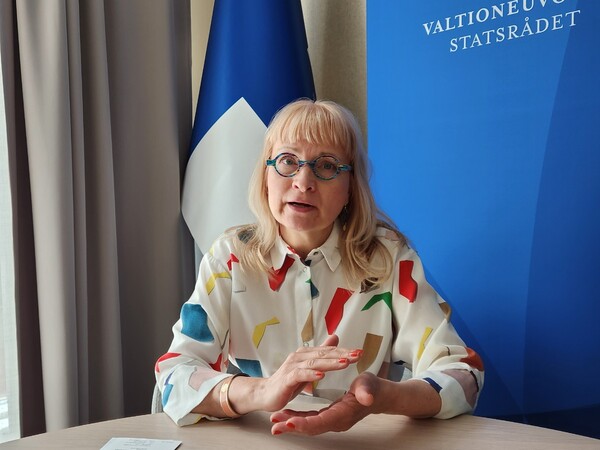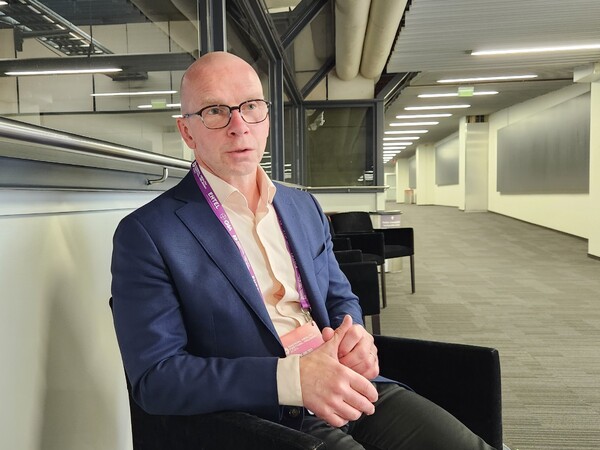HELSINKI -- By Marianne Chang/Korea Biomedical Review correspondent -- Finland might be the happiest nation in the world for the sixth consecutive year but the Finns are not satisfied with just this accolade and are making all-out efforts to ensure their health sector can be equally recognized.
"Nokia helped establish Finland's digital infrastructure, resulting in the widespread adoption of mobile phones and a culture that embraces digital devices in the 1990s," explained Dr. Päivi Sillanaukee, Special Envoy for Health and Wellbeing at the Ministry of Social Affairs and Health, in an interview with Korea Biomedical Review at the office of the Ministry of Transport and Communications in Helsinki, on Tuesday.

In particular, their strategic focus areas are in developing age-tech, sustainable future hospitals, early testing platforms for prototype medical devices, secondary use of social and healthcare data, and digitally assisted well-being for the elderly.
“We wanted to combine the idea of Slush, an annual Finnish health tech event for start-ups together with Davos, a global conference for initiating policy discussions to create an equivalent event for the health sector,” said Sillanaukee explaining the origins of the Radical Health Festival Helsinki, which was held this week.
How far has Finnish healthcare progressed?
But in many ways, the Finns have already made big strides in healthcare. The FinnGen study which was launched in 2017 to collect and analyze genomic and health data from 500,000 Finnish biobank participants is nearing completion in autumn this year.
The study takes advantage of Finland's unique population structure, comprehensive electronic health registers, epidemiological studies, and enabling legislation to reveal unique disease biomarkers.
As a result, the unique genetic insights already generated from the Finns have captured the interest of 13 international pharmaceutical companies including MSD, Pfizer, GSK, Janssen, and AstraZeneca, forming a public-private partnership with the biobank.
However, they also want to use this biodata to facilitate precision cancer medicine. iCAN is another Finnish national project using AI to extract predictive features from 15,000 tumors of patients’ longitudinal health data to increase knowledge of immuno-oncology, the tumor microenvironment, and the development of disease resistance.
Sillanaukee credited these advancements foremost to the trust of Finnish citizens.
“The trust of Finnish people in the healthcare system has been crucial in encouraging them to share their biodata for use in improving healthcare,” she said.
Furthermore, the establishment of a taxation-based welfare system in Finland also helps guarantee equal access to education, social services, and healthcare.
Sillanaukee further highlighted the robust social and health service reform, the utilization of digital systems, and legislation to support the secondary use of data for research as key factors in improving the integration and effectiveness of healthcare delivery.
Accordingly, Finland now has several databases that contribute to its digital health ecosystem, including national health registers, biobank data, and socioeconomic data. Together, these databases leverage health solutions and enable research in the country.
Finland, an enabling environment for digital health start-ups
In another interview with KBR, Juha Paakkola, Director of Health Capital Helsinki, highlighted the fact that both Korea and Finland share similar levels of advanced integrated healthcare systems with 100 percent electronic medical records that can be leveraged to obtain mutual healthcare benefits.
“Population-wise, both Finland and Korea represent small countries in Europe and Asia respectively,” he said. “Not only can we lean on each other to enter each other’s markets but also team up to enter larger markets for areas of mutual interests.”
Aging societies and projects focused on artificial intelligence (AI) and robotics for elderly care are being noted as areas for collaboration.

“Our genetic population and position as a core part of the European Union make us an attractive market for clinical research and innovation, especially in the areas of AI and digital health,” he said.
At the same time, he stressed the importance of learning and exchanging best practices between Finland and Korea, both in terms of government-to-government and public-private partnerships.
Paakkola also drew attention to Finland as a supportive ecosystem and willing partner for innovation and start-ups in digital healthcare due to its advanced electronic medical records (EMR) system.
Currently, Korean digital healthcare start-ups are in Finland together with Daewoong Pharmaceutical to exhibit digital healthcare solutions at the Radical Health Helsinki Festival.
Digitalization's impact on the healthcare ecosystem and remaining challenges
Due to this enabling environment, there have been numerous promising digital healthcare start-ups in Finland, said Sillanaukee. Although she refrained from mentioning specific start-ups, she explained that the work of start-ups spans diverse areas such as digital therapeutics, smart hospital technologies, and mobile phone-based diagnostics.
Still, Finland faces challenges balancing the utilization of data for research with maintaining confidentiality and privacy. Legislation surrounding biobanks and the secondary use of healthcare data has been established but the use of personal health data is strictly regulated by the general data protection regulation (GDPR) in Europe, which presents complexities in sharing and discussing information.
In this regard, Paakkola said, “Ongoing discussions are taking place at both the national and European levels to strike a balance between research benefits and data security, ensuring individual privacy while maximizing the potential of data sharing.”
While patients and healthcare providers have access to their own data within their respective systems, conducting research that involves multiple databases still requires additional permissions and ethical considerations to recognize the full value of big data, he explained.
As such, in January 2024, the current Biobank Act will be revised to align with the requirements of GDPR granting individuals the option to opt-out and the Act on the Secondary Use of Health and Social Data has already been revised allowing for the utilization of the data as coded information to ensure secure data.
Related articles
- ‘Slow adoption of AI, DTx solutions prohibitive in medical field’
- Daewoong's digital healthcare start-ups to seek stronger ties at Helsinki event
- Are Korean hospitals still leading medical digitalization?
- Regulator ‘half-positive’ to digital healthcare firms' request to introduce DCTs
- Korean digital health start-ups gain traction at Helsinki meet
- [Reporter’s Notebook] What should Korea's biobank benchmark from other countries?
- Finland ready to foster new health collaborations with Korea on 50th anniversary

